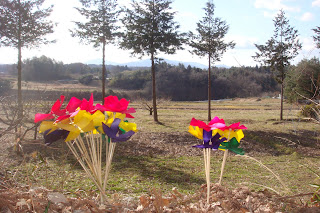On Tuesday when everyone was in a panic, when we heard that some of our biggest customers were evacuating staff, I asked Takeshi to do some research on the dangers of radiation and give me some information that I could make sense of. This is what he sent and it helped me stay cool under very trying circumstances.
Over to you, Takeshi.
What's a Micro Sievert?
The micro Sievert is an attempt to quantify the effect of radiation on living organisms. So the same radio active particle will do more damage if it's inhaled than if it was on the hand. In micro Sievert, the inhaled particle will be higher than the particle on the hand. A chest X-ray has a higher micro Sievert value than an X-ray of the hand.
The news are reporting the measurement in micro Sievert but the actual measurements are made in micro Gray and it's assumed to be a one-to-one conversion. It's a bit like, when you measure wind speed, you measure it in knots (or metres per second) with your wind meter. This is like your micro Gray. 35 knots is a storm for a yacht but it's just a gale for a big tanker. So how much the wind affects your ship is like the micro Sievert.
The Sievert value also depends on what kind of radiation it is. So alpha particles have higher micro Sieverts (of a given micro Gray) but can be blocked by a sheet of paper. Gamma rays have lower micro Sieverts but you need lead to block it.
What the readings mean
Fukushima prefecture with useful data and advice:
http://www.pref.fukushima.jp/j/ 県内各地方 環境放射能測定値(第31報)について
Typical normal background level for Koriyama is 0.04-0.06 micro Sv/hr. The highest level in Koriyama over the last few days was 2.8 micro Sv/hr. It was even higher in Fukushima, reaching 24 micro Sv/hr.
Radiation occurs naturally so in Koriyama, you would typically receive 0.04-0.06 micro Sv/hr from cosmic rays coming from space, from the rocks but the largest component comes from breathing in naturally occurring radon gas that comes out of the earth. Let's say the average background radiation you receive in Koriyama is 0.05 micro Sv/hr. The news is quoting the values in Sv/hr so let's use that.
The average normal background radiation in Koriyama of 0.05 micro Sv/h. This is a typical figure for Japan [1] but it's low compared to the rest of the world. For comparison, the average for the UK is 0.3 micro Sv/h and 0.9 micro Sv/h in Cornwall [3]. So the highest level registered in Koriyama in recent days of 2.8 micro Sv/hr seems high but if you went to Cornwall for 3 days, you'll get the same amount you're getting in Koriyama in a day if this level continues. You probably wouldn't be worrying about radiation when you visit Cornwall.
If you fly from Narita to Heathrow, every hour, you get 6 micro Sv/h [4]. That's double what you're getting in Koriyama at the moment but you probably worry more about an aviation accident than radiation.
If you smoke a cigarette, you're exposed to 1 micro Sv per cigarette [5]. Again, you will probably worry more about the tar than radiation.
What's the risk?
Let's say the radiation level reaches double what's been recorded in Fukushima and goes to 50 micro Sv/hr and stays there. If you stay indoors, it'll be less. Over one day, this adds up to 1,200 micro Sv/day. Increased risk of cancer becomes more clear for doses above 100,000 micro Sv/yr. Which means you'd have to be in an area of 50 micro Sv/day for over 80 days. Let's say that if it gets to that point, the people of Koriyama evacuate within 10 days. They recieve 12,000 micro Sv. By the way, that's only 30% more than the annual dose that the cabin crew flying Tokyo-New York receive [6].
The increased risk of cancer death due to 10,000 micro Sv exposure is thought to be about 0.08% [7]. That's if the radiation is received in one go. It'll be less if it's over days. We'll be cautious and use the higher 0.08% value for 12,000 micro Sv so the risk of cancer is about 0.1%. Given that about 25% of the deaths in UK are from cancer, that's just 0.1% on top of 25% [8]. Other things that have a 0.1% risk of death [9]:
Driving 40 miles each day , 5 days per week for 4 years
Smoking 10 cigarettes per day for 5 months
Living in New York City for 5.5 years (air pollution)
Apart from the smoking, you probably wouldn't worry much about the risk from these other things that raises your mortality by 0.1%.
References
首相官邸 日常生活と放射線
Wikipedia:
http://en.wikipedia.org/wiki/Sievert#Dose_Examples
NTEC:
http://www.ntec.ac.uk/nuclear_intro/doseunits.html
Wikipedia:
http://en.wikipedia.org/wiki/Radiation_poisoning
Radiation Exposure: The Facts vs. Fiction:
http://www.uihealthcare.com/topics/medicaldepartments/cancercenter/prevention/preventionradiation.html
BBC:
http://www.bbc.co.uk/news/health-12722435
http://www.physics.isu.edu/radinf/risk.htm
BBC:
http://www.bbc.co.uk/news/health-10718504
http://www.physics.isu.edu/radinf/risk.htm
Informative links:
Good overview of the Fukushima 1 Nuclear Accidents (much better than the Japanese version)
http://en.wikipedia.org/wiki/Fukushima_I_nuclear_accidents
What to do in the event of a nuclear emergency - they probably never thought it'll be needed
http://www.atom-fukushima.or.jp/qa/qa-177/anther.shtml
Radiation monitoring links:
Fukushima prefecture with useful data and advice:
http://www.pref.fukushima.jp/j/
Useful article on radiation monitoring and what the units mean:
http://gigazine.net/news/20110316_geiger_counter_matome/
Long-term monitoring in Kanagawa-ken. You can see a big spike in the 1-year graph from the recent accident
http://www.atom.pref.kanagawa.jp/cgi-bin2/telemeter_dat.cgi?Area=3&Type=W
My notes
科学文化省 都道府県別環境放射能水準調査結果
http://www.mext.go.jp/a_menu/saigaijohou/syousai/1303723.htm
In Futaba Mura, near the power stations, the normal radiation is 0.037-0.071 micro Sv/hr. This pretty similar to the level in Tokyo (0.028-0.079) and it's about the national average.
The statements here are the opinion of the opinions of the author and should not in any circumstances be taken as advice or recommendations. While the best efforts have been made to check the facts and calculations, not all the figures have been verified with reliable sources. The calculations and interpretations have not been checked with an expert.











